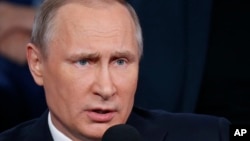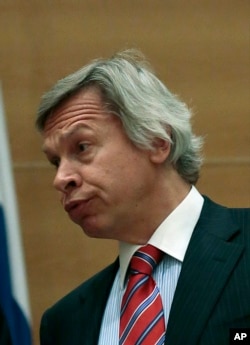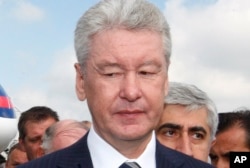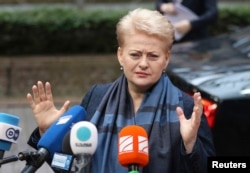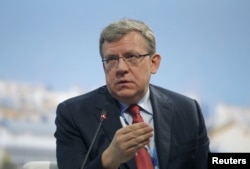Russia reacted to Britain’s vote to exit the European Union with a mix of pleasure, understanding and concern.
Some Russian politicians celebrated the Brexit, taking aim at the EU and its Western allies.
“Brexit reflects the crisis in the EU governance model,” tweeted senior Russian lawmaker Alexey Pushkov, adding that it was a “personal failure of [U.S. President] Barack Obama.”
Obama, and other Western leaders, had urged Britons to vote to stay in the 28-member regional grouping.
The Kremlin’s efforts to disrupt European unity and Russian state media’s fomenting of euroscepticism have led many analysts to conclude that Moscow favors the Brexit choice.
"Nobody wants to feed and to subsidize weaker economies, provide for other states, for whole nations — this is an obvious fact,” said President Vladimir Putin in comments explaining why he understood the Brexit vote. “People are dissatisfied with the decision of the security issues that have sharply deteriorated in the face of strong migration processes. People want to be more independent."
'Anti-American act'
The Kremlin views the Brexit as weakening both the EU and the Euro-Atlantic alliance with the United States, said Ilya Kravchenko, an expert for the Russian International Affairs Council.
“Moscow tends to view Brexit as an anti-American act,” he told VOA by email. “Because Britain is seen in Russia as a ‘Washington trumpet,’ and with today’s referendum result, can change its position on key issues, which as of yet, include sanctions and Ukraine.”
Some Russian officials raised hopes that without Britain’s strong support for sanctions against Russia in the EU, the punitive measures over its actions in Ukraine might be softened.
“Without Britain, the EU will have no one so zealously upholding Russia sanctions,” Moscow Mayor Sergey Sobyanin tweeted.
Ukraine's President Petro Poroshenko expressed hopes that sanctions would continue against Russian aggression.
Sanctions relief will not come sooner because of Brexit, Kravchenko said, because secession is going to be a years-long process.
“Meanwhile, Russia’s actions in Ukraine are viewed by an absolute majority of the EU members as crucial for European security today, not in a couple of years,” he said.
Baltics regret Brexit
Baltic states, among the most concerned with a weakening of EU resolve against their much larger and historically dominant neighbor, expressed regret at Britain’s vote to leave the union. Lithuania’s President Dalia Grybauskaite tweeted a concise reaction to Britain’s vote: “Brexit: respect, regret, re-engage.”
Latvia's Foreign Ministry said it regretted the vote but vowed to maintain close relations with Britain and protect its national interests.
Estonia’s Foreign Ministry called the British “No to the EU” decision a “great loss” that would impact the economy. But in a statement, the ministry said there was no impact on Britain’s contribution to security as a member of the NATO military alliance.
“Britain was among the founders of NATO and will stay with the main principles of the organization,” Kravchenko said. “And it is not going anywhere when it comes to regional security or its commitments to allies in NATO.”
Brexit fallout
The Russian president acknowledged that Brexit would undoubtedly have consequences for the world and Russia. Russia’s concern was stability and predictability in Europe, said the Kremlin’s spokesman as both were being brought into question on Britain’s vote.
Russia’s currency and stocks took an expected hit as markets dropped worldwide. Putin said markets would recover in the midterm.
“About 40 percent of Russian trade turnover is with the EU,” Kravchenko said. “If there is a recession in the European economy, the demand for oil, gas and other Russian goods falls. Russia, unfortunately, is not immune to the negative effects of Brexit.”
But “Russia is not significantly affected by Brexit,” tweeted Russia’s former finance chief, Alexei Kudrin. “We have our own problems.”
Moscow is expecting a chain reaction that might follow the secession of Britain from the EU and is well aware of right-wing populist parties in France and Holland scoring points from Brexit, Kravchenko said.
“And what is more sufficient for Russia, most of those nationalists don’t really care about Russian actions in Ukraine or elsewhere, unless they can somehow damage their national interest,” he said. “But the spread of secessionism in the EU will lead to a weak euro currency, in which many Russian oligarchs keep their money. They can’t look at it positively.”
Public opinion
In the Russian capital, Sergei Shust, a logistics manager, said it would be better for everyone if the U.K. stayed in the European Union.
"It will keep the EU more stable," he said. "There will be less tension, we will understand each other better ... so I think that normal Russians want the same. What's good for the EU is good for us — it makes for fewer grievances.”
Other Russians on the streets of Moscow disagreed.
Librarian Lena Vasilyeva welcomed the vote for Brexit.
“I’ve always felt that England didn't really fit in the European Union because they have a different culture and currency," she said. "So I think it was a good decision. The European Union is very dependent on America; therefore, the European Union is against Russia. But England is a very strong empire. Maybe if it is no longer with the European Union, it could partner with Russia. That's why I think this is a good thing for Russia.”
Restaurant businessman Andrei Kostin said the news was not so important for ordinary Russians, "because we respect any choice made by the people of Britain.”
"It's a matter for Britain and the European Union," Kostin added. "I think they'll work out their relationship by themselves.”




